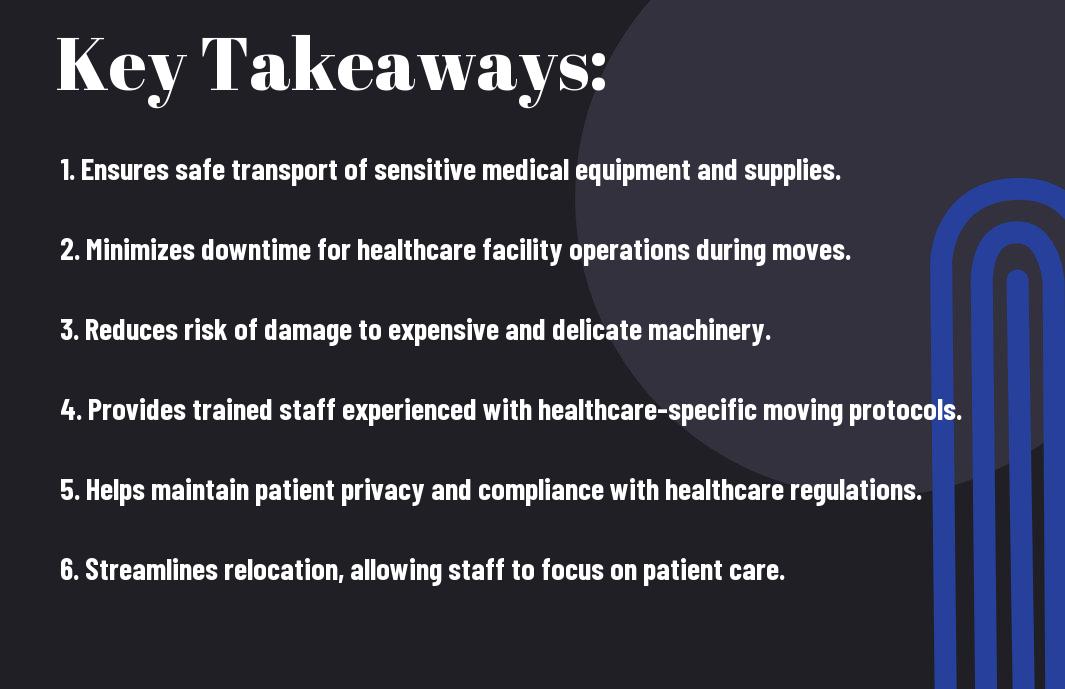Over the years, you may have faced numerous challenges when relocating your healthcare facility. Ensuring minimal disruption to patient care while navigating the complexities of moving medical equipment requires specialized knowledge. By enlisting professional moving assistance, you can safeguard your valuable assets, streamline the process, and maintain compliance with healthcare regulations. Understanding the benefits of expert support can not only enhance the efficiency of your move but also ultimately contribute to better patient care in your new location.

The Unseen Challenges of Relocation in Healthcare Settings
Moving healthcare facilities involves a myriad of hidden challenges that can disrupt operations. From managing the logistics of specialized medical equipment to ensuring compliance with health regulations, each step requires meticulous planning. You might encounter unanticipated delays or complications, such as the need for additional permits or finding suitable transportation for fragile supplies. Additionally, you may face challenges in communicating with staff and patients about the transition, which can lead to confusion and dissatisfaction.
Infrastructure Resilience During Transitions
The integrity of your facility’s infrastructure during the relocation process directly impacts operational efficiency. As you move, you must ensure that critical systems—such as power, HVAC, and IT networks—remain functional. A temporary breakdown can jeopardize patient safety or lead to expensive delays. Your strategy should include detailed contingency plans to maintain service levels and prevent disruptions in service delivery.
Patient Care Continuity Concerns
Any disruption during a move can directly affect the continuity of patient care. You need to account for the potential impact on scheduled treatments, emergency services, and even staff assignments. Without careful planning, your patients may experience cancellations or delays that can impede their treatment plans, causing additional stress in their recovery journey.
Maintaining patient care continuity during relocation isn’t just about ensuring appointments are honored; it’s about providing consistent therapeutic environments and uninterrupted access to vital medical records. Inadequate planning could lead to patients being transferred to different facilities or lengthy delays in accessing crucial treatments. For example, a single day of uncoordinated transitions might result in multiple patients missing their chemotherapy sessions, which could have severe implications for their health. Prioritizing communication between departments and implementing a clear plan for patient tracking can significantly mitigate such risks, ensuring that your care protocols remain intact even amid the chaos of relocation.
The Impact of Professional Moving Expertise on Operational Efficiency
Engaging professional moving services can significantly enhance operational efficiency for healthcare providers. With skilled teams managing the complexities of relocation, you can focus on maintaining quality patient care rather than getting bogged down by logistics. By having experts at the helm, your facility can transition smoothly, ensuring necessary equipment and services are ready for use at the new location without extensive downtime.
Streamlined Logistics and Scheduling
Effective moving professionals optimize logistics and scheduling, creating a precise timeline that aligns with your operational needs. Their expertise allows for meticulous planning around crucial service times, coordinating equipment transfers and minimizing any potential bottlenecks. This structured approach ensures that you stay on track, allowing for better resource management during the transition.
Minimizing Disruption to Health Services
Disruption during a move can affect patient care and operational continuity. Professional movers work diligently to minimize this impact, utilizing strategies like relocating less critical areas first and maintaining crucial services throughout the process. In fact, many moving companies offer specialized services tailored to the healthcare sector, ensuring minimal interruption to healthcare delivery during the transition.
Minimizing disruption to health services during relocation is vital for maintaining patient trust and satisfaction. For example, a well-planned moving strategy may prioritize the transfer of high-demand areas, such as emergency rooms or surgical suites, first. Continuous communication between your staff and the moving team can further alleviate concerns, allowing for real-time adjustments as needed. Using professional services not only protects your reputation but also allows your team to concentrate on delivering uninterrupted care during the move.
Regulatory Compliance: Why Professional Movers Matter
Adhering to regulatory compliance is non-negotiable for healthcare providers, necessitating the involvement of professional movers who understand the intricate landscape of healthcare regulations. These specialists mitigate risks associated with violations that could lead to substantial fines or operational delays, ensuring that every item is moved in accordance with legal standards. Their expertise not only safeguards your institution but also fortifies the trust your patients and community place in your services.
Navigating Healthcare Regulations and Standards
Healthcare regulations are complex and multifaceted, covering everything from the handling of patient records to the transportation of medical equipment. Professional movers possess the knowledge to navigate these standards, ensuring your move remains compliant with HIPAA, OSHA, and other pertinent regulations. This prevents costly oversights that could jeopardize your facility’s operational integrity and licensure.
Ensuring Safety Protocols Are Maintained
Safety protocols during a move are paramount, particularly in a healthcare environment where the stakes are often life-critical. Professional movers implement stringent safety measures to protect sensitive materials and equipment, keeping staff and patients secure throughout the transition.
Maintaining safety protocols involves not just adhering to regulatory requirements, but also implementing industry-specific best practices. For example, movers should utilize specialized packing methods for fragile medical equipment, ensuring items are secure during transport. Equipped with proper training, they perform risk assessments and develop customized moving plans that address potential hazards. This careful planning and execution greatly reduce the risk of accidents, safeguard valuable assets, and ensure a smooth transition that minimizes disruption to patient care and services. By prioritizing safety, you can focus on what truly matters—caring for your patients while ensuring a seamless relocation experience that meets all regulatory standards.
Cost-Benefit Analysis of Hiring Professionals Versus DIY Moves
Evaluating the financial impact of hiring professional movers versus attempting a DIY relocation reveals critical insights. While in-house teams or external vendors often seem like a cheaper alternative initially, hidden costs can quickly accumulate. These expenses may include lost productivity, potential damages to sensitive equipment, and the subsequent need for repairs. A thorough cost-benefit analysis underscores that professional assistance not only minimizes risks but also contributes to a smoother transition, ensuring that your practice can continue functioning with minimal disruption.
Long-Term Financial Implications
Over time, opting for professional moving services can lead to significant savings. The cost of damaged medical equipment, lost revenue during operational downtime, and the expenses tied to employee burnout from a DIY move can far exceed the upfront fees associated with hiring experts. Investing in professional help fosters a stable environment, allowing you to focus on patient care rather than logistical challenges, ultimately supporting your bottom line in the long run.
Value of Time and Resources Saved
The hours you or your staff could spend managing a move might be better allocated to patient care or administrative tasks. Professional movers streamline the relocation process, allowing for a quicker and more efficient transition. By utilizing experts, you free up valuable resources and energy that can be redirected towards your core operations, improving overall productivity.
When considering the value of time and resources saved, think about what your time is worth in your practice. If a healthcare provider averages $200 an hour in billable services, even a few hours spent coordinating a move can lead to significant earnings lost. Professional movers not only expedite the moving process, but they also minimize stress by handling logistics, ensuring that your team can concentrate on serving patients without the distraction of a relocation. This efficiency translates into a more successful operation, where both financial and time resources are optimized efficiently.
Perspectives from Healthcare Providers: Testimonials and Insights
Healthcare providers often share powerful stories about the impact of professional moving assistance. Many express relief at having experts handle the logistical complexities of relocation, allowing them to focus on patient care. A hospital administrator noted that working with a professional moving team saved their staff countless hours, enabling them to maintain high-quality service throughout the move. Testimonials highlight not just efficiency, but also the value of having professionals who understand the specific needs of healthcare environments.
Real-Life Experiences with Professional Movers
During a recent relocation, a community clinic encountered several unexpected challenges mitigated by their professional moving team. They reported that having experts on-site helped them navigate fragile medical equipment transportation, which could have easily become a costly setback. With the support of seasoned movers, the clinic was able to maintain business continuity, ensuring minimal disruption to patient services.
Lessons Learned from Past Relocations
Insights gained from previous relocations often inform future decisions. A healthcare provider recalled a past move where lack of proper planning led to delays and service interruptions. Learning from that experience, they emphasized the importance of detailed pre-move assessments and professional involvement to establish timelines and processes that safeguard their operations during transitions.
The same healthcare provider highlighted a pivotal lesson: always include your moving team early in the planning stage. Engaging professional movers to assist with logistical mapping prevented costly mistakes during their latest relocation. They found value in consultation sessions, which provided clarity on key fragility considerations for medical equipment. This collaborative approach ultimately resulted in a smoother transition with clearly defined roles, leading to a more organized and efficient relocation process. By leveraging expertise, you can avoid pitfalls that often accompany these complex moves, enhancing overall operational resilience.
Final Thoughts: The Essential Role of Professional Moving Assistance in Healthcare Transition Success
Effective relocation hinges on meticulous planning and execution, particularly in healthcare settings. Consider a hospital that experienced a significant drop in patient satisfaction during a move due to unanticipated delays, resulting in costly operational downtime. Engaging professionals ensures that each phase of your transition, from packing sensitive equipment to setting up critical care areas, is handled with expertise and efficiency. By investing in professional moving assistance, you not only safeguard your facility’s reputation but also bolster staff morale and patient care continuity. Success during transitions is rooted in collaboration and attention to detail—elements that professional movers provide abundantly.




